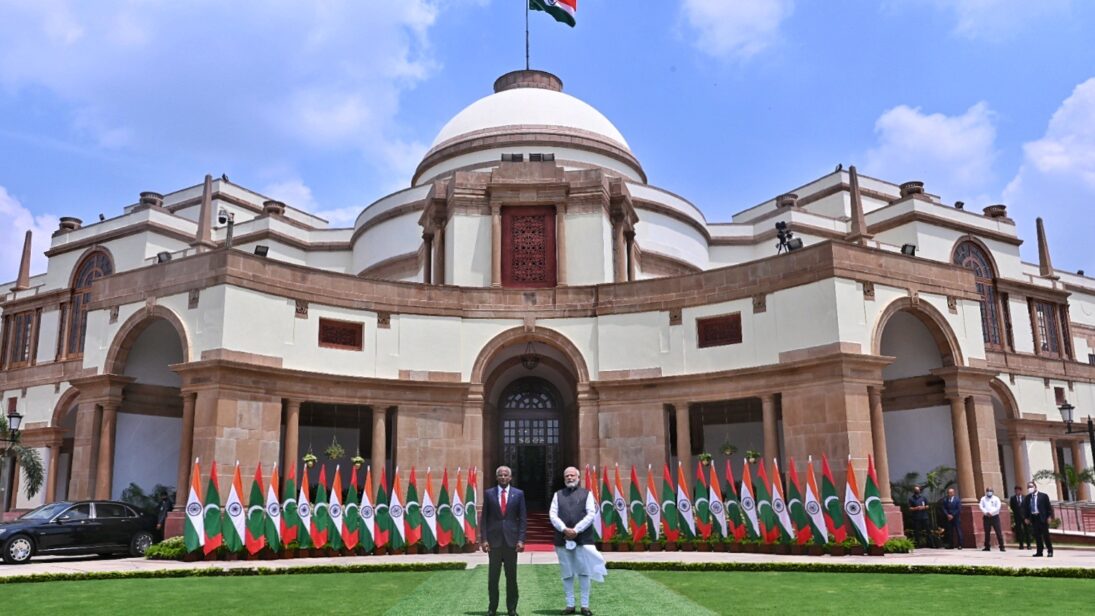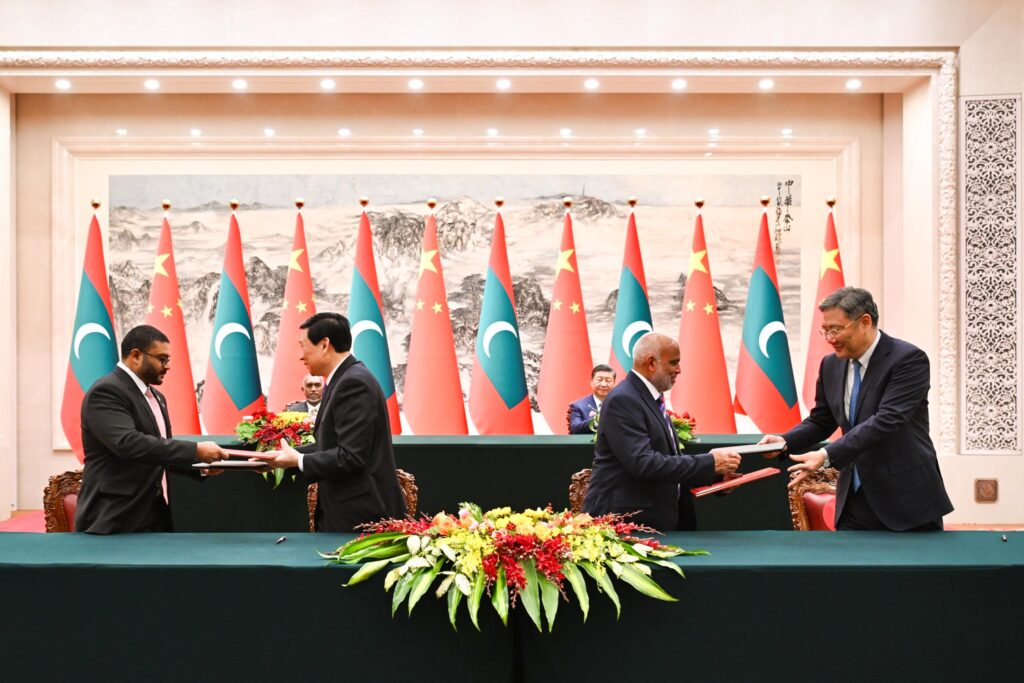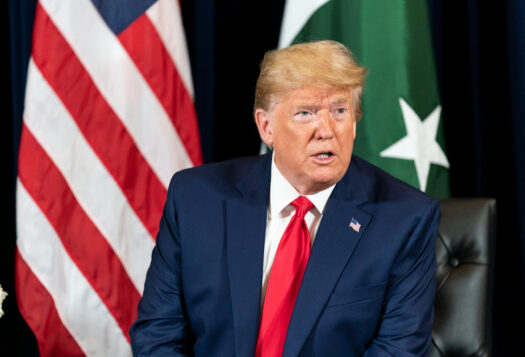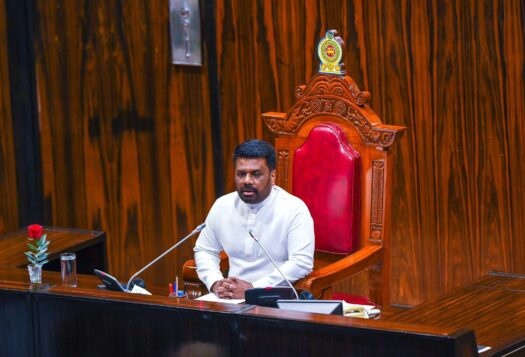
After almost a year of antagonistic rhetoric toward India and a shift toward China, the Maldives appears to be taking steps to mend and strengthen its traditional ties with New Delhi. On August 26, a high-level delegation from the Indian Ministry of External Affairs visited the Maldives to assess the progress of ongoing development cooperation projects in the country. That visit was preceded by a three-day trip to the Maldives by India’s External Affairs Minister, S. Jaishankar, in early August. During this trip, Jaishankar had been cordially welcomed and several significant memoranda of understanding (MOUs) had been signed between the two countries to bolster bilateral cooperation. Adding to the momentum of these developments, New Delhi most recently hosted a defense dialogue with the Maldives in the first week of September.
The Maldives’ sudden rapprochement with India constitutes a pragmatic response to severe economic pressures and competing strategic imperatives. As the Maldives grapples with financial distress, Maldivian President Mohamed Muizzu has recognized that an over-reliance on China is not the most prudent strategy for his country’s economy. But to sustain this shift and safeguard its own presence in the Maldives, New Delhi too will have to pursue a foreign policy that is agnostic to Maldivian domestic politics.
A Diplomatic Frost Thaws
Since Muizzu came to power in November 2023, the Maldives has undertaken what many scholars and analysts have seen as a relatively pro-China posture while distancing itself from India, its traditional ally. During his rise to the presidency, Muizzu had championed an “India Out” campaign aimed at reducing New Delhi’s influence and presence in the country. The campaign gained domestic popularity due to concerns over India’s growing military presence in the country, which many perceived as threatening to Maldivian sovereignty. The coalition had also tapped into apprehensions over the status of India’s Muslim minority under Prime Minister Narendra Modi.
Consequently, Muizzu oversaw efforts to reduce India’s influence in the Maldives. Shortly after coming to power, Muizzu asked India to withdraw its military personnel from the three aviation platforms in the Maldives where they had been stationed. He also terminated a 2019 hydrographic survey agreement with New Delhi.
Concurrently, Muizzu also took a series of steps with Beijing that further unsettled New Delhi. In February, Muizzu controversially allowed a Chinese research vessel to dock in Male, amid suspicions in New Delhi that the ship was covertly collecting underwater data to aid submarine navigation and stealth operations in the Indian Ocean Region. India’s concerns were further heightened the following month when China signed a security deal with the Maldives granting it free of charge military assistance. While the specifics of this agreement have not been made public, and it is unclear if the deal allows Chinese troops to be stationed in the country, some analysts in New Delhi suspect that Male has given Beijing access to dual-use facilities. Separately, Muizzu also roped in the China Harbor Engineering Company to develop an agricultural project in strategically sensitive Uthuru Thila Falhu, which is near India.
Maldivian President Mohammed Muizzu has recognized that an over-reliance on China is not the most prudent strategy for his country’s economy. But to sustain this shift and safeguard its own presence in the Maldives, New Delhi too will have to pursue a foreign policy that is agnostic to Maldivian domestic politics.
Muizzu’s measures added up to engendering tensions between India and the Maldives. However, the two Indian visits to the Maldives last month — the first by Jaishankar and the second by the high-level Indian delegation — mark a dramatic turnaround. During these visits, the Muizzu administration not only welcomed Indian assistance but also signed several MOUs aimed at enhancing bilateral cooperation. Although Muizzu has not yet reversed his call for the Indian military to withdraw from the country, he did publicly acknowledge India as the Maldives’ “closest ally” — an apparent reversal from his previous embrace of China and the Belt and Road Initiative (BRI).

Economic Context Behind the Rebalancing
Muizzu’s reconciliatory rhetoric toward India may be primarily attributed to the Maldives’ mounting economic troubles. With its economy presently valued at USD $7.2 billion, the Maldives’ debt level remains at over 115 percent of Gross Domestic Product (GDP). From 2022 to 2024, the country has been obligated to spend an average of USD $300 million annually toward servicing its foreign debt. The Maldivian government is scheduled to service almost USD $1 billion in debt in 2026 alone — the highest debt repayment in a single year in the country’s history.
Ties with China have only served to heighten these fiscal concerns. Over 60 percent of the Maldives’ sovereign-guaranteed debt is owed to Chinese financial institutions such as the China Development Bank and Export-Import Bank of China. As economic cooperation with China grows, the Maldives’ debt burden may become unsustainable, leading to mounting pressure to borrow more and risking uncontrollable inflation.
Some Maldivian politicians have also expressed worries that this debt-fueled partnership may give China greater influence over the country’s economy. This concern is exacerbated by the fact that Chinese institutions significantly outweigh other foreign institutions within the Maldives’ debt portfolio. For example, in the Maldivian government’s outstanding external debt, the Export-Import Bank of China accounts for double the share of the Export-Import Bank of India.
Under the circumstances, Muizzu is likely recognizing that he needs to restore a careful balance between the Maldives’ two largest partners — India and China. Amid souring relations, New Delhi had slashed aid to the Maldives by 48 percent in its latest annual budget earlier this year. Tourist arrivals from India had also fallen by 33 percent between March 2023 and March 2024. This was economically consequential given that the tourism sector constitutes over 22 percent of the Maldivian GDP and Indians formed the largest group of foreign tourists to visit the Maldives in the post-pandemic years. Owing to the economic impact of these developments, Muizzu now hopes to reset the relationship with India and restore a healthier balance between influences from India and China in the country’s economy.
The economic rationale for resetting ties with New Delhi is especially strong given that Indian support — in terms of both finance and technical expertise — has long been critical to the Maldives. Since 2022, India has extended USD $900 million in credit to the Maldives for multiple projects, including the development of water and sanitation facilities in 34 islands, the redevelopment of the Gan International Airport, and road development and land reclamation in the Addu Atoll. India is also involved in the Greater Male Connectivity Project (GMCP) financed by a separate loan-plus-grant of USD $500 million designed to connect the capital city of Male with three neighboring islands. Beyond these large-scale projects, India is also supporting 65 community development projects across the Maldives worth USD $23 million, which include a diverse array of fish processing plants, drug detoxification centers, cultural centers, and sports complexes. Despite Muizzu’s pivot to China, reports suggest that many of these projects remained unaffected. In fact, as a goodwill gesture amid tensions earlier this year, India resubscribed to the Maldivian government’s USD $50 million treasury bill for another year.
Sustaining the Recalibration
The recent recalibration in Maldivian policy toward India demonstrates how economic realities can often outweigh ideological positions in foreign policy. Despite campaigning for power through rhetoric aimed against India, Muizzu seems to have recognized that an over-reliance on China is a poor economic strategy and can significantly hurt his country’s geopolitical leverage. The Maldives needs both India and China by its side while maintaining a careful balance, so as to not lose one partner while gaining another.
In order to successfully navigate the rivalry between India and China, the Maldives would have to be careful not to mix its economic and security cooperation programs. In its dealings with India and China in the past, the Maldives has often taken the approach of offering package deals — throwing in security alignment with economic partnerships. Instead, the Maldives may need to decouple security agreements from economic agreements. Such decoupling could help assuage any concerns in both Beijing and New Delhi that the Maldives is acting under the influence of the other power. In the same spirit, the Maldives would then be able to maintain fruitful relationships with both its partners if it pursues increased transparency on what each cooperation initiative entails.
The recent recalibration in Maldivian policy toward India demonstrates how economic realities can often outweigh ideological positions in foreign policy.
On its part, India should take a mature and foresighted policy approach, agnostic to domestic political rhetoric in the Maldives. Political parties in the Maldives have often oscillated between India and China since the country’s first multi-party presidential election in 2008 — running campaigns along the lines of “one partner in, one partner out.” Muizzu’s “India Out” campaign was only the latest example of this. Instead of buying into this partisan rhetoric, New Delhi should pursue a foreign policy based on equal engagement with all major political players in the Maldives.
To sustain long-term ties, leaders in both India and the Maldives should also foster an environment that discourages public grandstanding against each other. Early this year, for instance, several Indian celebrities issued calls for a boycott of travel to the Maldives after three Maldivian officials passed controversial comments against Modi. Such incidents will hurt both Indian and Maldivian interests. Muizzu’s recalibration offers both India and the Maldives a chance to reinforce their ties and pursue their common goals. The Maldives should use this opportunity to carefully balance its relationships with India and China. India should reciprocate wisely in order to ensure that the rapprochement proves sustainable.
***
Image 1: MEAphotogallery via Flickr
Image 2: The President’s Office of the Republic of Maldives via Wikimedia Commons


